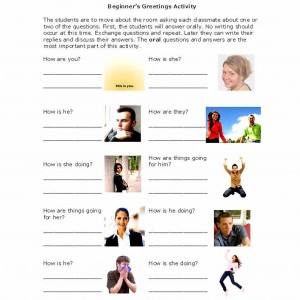ESL Teaching Activities for Beginners – Friendly Greetings
- Posted by Daisy Stocker
- Date June 1, 2011
- Comments 3 comments

Simple Greetings Activity with Handouts
The informal language we use when we meet our friends or family is often idiomatic. ESL beginners can find it very confusing unless they are introduced to the short greetings that we all use. Students need to participate in many activities that provide opportunities for them to practice with their classmates. This article will suggest an introduction to the most commonly used expressions and provide some fun activities.
We suggest that role-plays are the easiest way to introduce greetings to your students. One way to do this is for the teacher to ask the initial question and the students to answer in unison. Write the possible commonly used answers on the board.

Let’s begin with the positive responses.
EXAMPLE:
Teacher: How are you?
Students: We are fine. Or We are fine, thanks.
Student: I’m fine thanks.
Continue by introducing these questions and responses:

Teacher:
How are you doing, _________?
Student: I’m doing fine. Or I’m just great!
Teacher: How are things going?
Student: Things are going well. Or Everything is fine.
Now try the negative responses. Tell them they are feeling sick, tired, depressed or whatever.

Teacher: How are you?
Student: I’m so-so. (means: not good – not bad) Or I’m not so good.
Or I’m not very well. Or I’m sick.
Teacher: How are you doing, ______?
Student: I’m okay. (The meaning changes with the tone of voice.)
Teacher: How are things going?
Student: Not badly Or Not so good.
Students need to be able to use these expressions automatically. Consequently, the oral parts of the activities outlined in this article are the most important. It is our experience that students tend to skip the oral and complete the written parts. Watch closely and get them talking!
Greetings Lesson Plan
Complete Greetings Lesson Plan
Includes:
- Student Reader
- Student Worksheets
- Video
- Teacher Guide
Greeting Lesson Plan Video
ESL Activities
- Andrée’s Balloon Expedition – Part 2 Present Tense - The present tense is usually introduced first for English second language beginners. Although students will need to have studied this tense before they attempt these practice questions, a review is …
- ESL Practice Questions – Past Tense – Arctic Balloon Expedition – 1 - Teaching Grammar to English as a Second Language students can be a deadly bore. We’ve seen student sigh and shut their eyes at the thought of it. We know that …
- ESL Bingo Games! - People in every country participate in games, watch games and talk about games. They stimulate the economies of the world and foster international friendship and understanding. Why don’t we use …
- ESL Teaching Activities – Using Prepositions with Printable Handouts - ESL EFL Students from many different cultures find prepositions difficult because their meaning is expressed in a very different way in their own language. The preposition word doesn’t always express its meaning …
- ESL Teaching Activities for Beginners – Friendly Greetings - Simple Greetings Activity with Handouts The informal language we use when we meet our friends or family is often idiomatic. ESL beginners can find it very confusing unless they are …
- Suggested Activities and Role-plays for Teaching Verb Tenses - The order in which the verb tenses are introduced can make the structure of the English Language easier for the students to understand. Whereas pre-teen and early teen children learn …
Date Published: 2011-06-01
Date Modified: 2024-05-14
Daisy Stocker taught ESL in Eastern Europe for 10 years and was a primary school teacher in Canada for 30 years. Daisy has a B.A. and M Ed. in Education.
You may also like
Andrée’s Balloon Expedition – Part 2 Present Tense
The present tense is usually introduced first for English second language beginners. Although students will need to have studied this tense before they attempt these practice questions, a review is …
Teaching Grammar to English as a Second Language students can be a deadly bore. We’ve seen student sigh and shut their eyes at the thought of it. We know that …
ESL Bingo Games!
People in every country participate in games, watch games and talk about games. They stimulate the economies of the world and foster international friendship and understanding. Why don’t we use …

3 Comments
Nice points. I feel the more activities that you use the better.
Learning to speak English is a practical subject and so the more activities and role playing that can be done the better.
There are some very good points here that I can use right away.